
IRIS login | Reed College home Volume 96, No. 2: June 2017
Memorial for Professor Emeritus Steve Arch
We invite you to join us for a memorial service to honor Professor Stephen Arch [biology 1972-2012] on Saturday, April 20, at 3 p.m. in the Eliot Hall chapel.
After the memorial there will be a reception at the Green Dragon, 928 SE 9th Ave, Portland.
Continue reading Memorial for Professor Emeritus Steve Arch
Watson Winner Will Go to Africa
All roads lead somewhere. For Cole Perkinson ’13, they lead to Africa.
Cole, a chemistry-physics major, has been awarded a Watson Fellowship to spend a year in Africa exploring native music.
The Watson Year provides fellows with an opportunity to test their aspirations, abilities, and perseverance through a personal project that is cultivated on an international scale. Watson Fellows have gone on to become international leaders in their fields including CEOs of major corporations, college presidents, MacArthur “genius” grant recipients, diplomats, artists, lawyers, doctors, faculty, journalists, and many renowned researchers and innovators. The program offers a stipend of $25,000 to 40 fellows from 40 liberal arts colleges to pursue an independent study of something they are passionate about in a country that is not their own.
For Cole, that passion is Zimbabwean music, which he has played with his family since he was 10 years old.
Continue reading Watson Winner Will Go to Africa
RIP Professor Steve Arch
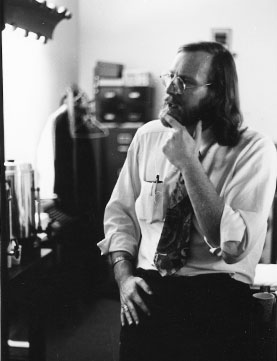
Courtesy of Special Collections, Eric V. Hauser Memorial Library, Reed College.
With sadness we report that emeritus professor Stephen Arch [biology 1972-2012] passed away of a heart attack this past weekend. He was appointed the Laurens N. Ruben Professor of Biology in 1995, and was department chair in 1994–96.
Explaining in an interview why he had decided to retire last year, Steve said, “I didn’t want to die in my office, literally or intellectually.” The end came while vacationing in Colorado with his wife, Elizabeth, and friends. He was vital right up until the end, still shooting noon hoops weekly at the sports center.
Daniel Walker ’07, who dodged his elbows more than a few times, remembered that Steve played basketball like he taught, “tough but fair.”
Continue reading RIP Professor Steve Arch
March Madness at Reed—Yes, Reed
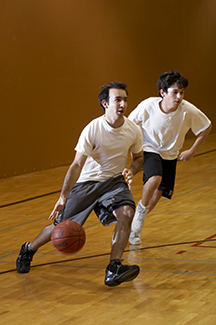
High fashion and devious fakery abound at Reed's March Madness (Photo from 2005). Photo by Orin Bassoff
Reedies packed the sports center on March 15 for an event they had been waiting for all spring. This wasn’t part of RAW, Reed’s annual arts week; it was a very different type of exhibition—March Madness.
Although March Madness at Reed may not feature as many teams—or as much advertising—as the NCAA version, its passion and intensity are unrivaled. This year marked the event’s 25th anniversary, and it showed in the approximately 200 spectators, participants, and supporters alike, who came out to watch the fun.
March Madness is a one-night, single-elimination tournament, featuring eight teams, compiled of Reed students, alumni, professors, and staff. The contest has its origins in 1989 when the Reed student team, which included Erik Brakstad ’89, was clobbered by a team made up of professors. “I thought to myself, where else would the student team lose to the faculty?” Erik said. He founded the tournament as a chance to get even for the loss, and the mania has only mounted since then.
Continue reading March Madness at Reed—Yes, Reed
How Do We Define Reed in the 21st Century?
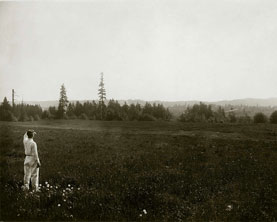
Reed President William Trufant Foster, looking over a field at the future site of Reed College, 1910. The field is on the cross-canyon northern side of campus, and there are cows in the pasture.
“Harvard, Yale, Princeton and Columbia universities reported record-low freshman admission rates for the 2013-2014 academic year as applications climbed above or held near all-time highs. Harvard offered seats to 2,029 students, or 5.8 percent of a record 35,023 applicants, the Cambridge, Massachusetts-based school said yesterday in a statement. Yale accepted 6.7 percent, Princeton offered admission to 7.3 percent and Columbia accepted 6.89 percent, the schools said in statements.
Top U.S. colleges that offer generous financial aid are luring record numbers of applicants even as the cost to attend increases faster than the pace of inflation and the number of high school graduates declines. The Common Application, an online form that lets students apply to multiple schools, has helped drive the surge.”
—Bloomberg.com, March 28, 2013
Continue reading How Do We Define Reed in the 21st Century?
Educating Women Steadies the World
New York Times columnist Nicholas Kristof argued that gender inequity is the central moral challenge of the 21st century in a public lecture that he delivered to a packed audience on Monday, April 1, in Reed’s Kaul Auditorium.
Using persuasive anecdotes from his book Half the Sky: Turning Oppression into Opportunity for Women Worldwide, Kristof began with the premise: “What slavery was to the 19th century, and totalitarianism was to the 20th century, gender inequity is to our time.”
The lecture was cosponsored by the Munk-Darling Lecture Fund in International Relations, as well as by the student group Reedies for Sexual Health Awareness (RSHA) and the offices of student services and student activities.
Continue reading Educating Women Steadies the World
Lena's Paintings on Display

Professor, author, translator, traveler, collector, mentor, and—yes, artist. Welcome to the protean career of Lena Lenček, pictured here at home with a series of watercolors she painted on a sabbatical visit to Tuscany. Photo by Leah Nash
Recent paintings by Professor Lena Lenček [Russian 1977–] appear in Geochromes: The Spirit of Place in Line and Color, showing through June 2013 in the Vollum College Center Gallery. Stephanie Snyder ’91, director of the Douglas F. Cooley Memorial Art Gallery, is curator.
The exhibition features works that Professor Lenček created during 2011–13 in some of the world’s most magical environments, including Tuscany, Puglia, the U.S. Southwest, Baja California, and the Oregon coast. Lenček states: “I chose a cloistered profession, but I’ve lived my life on the move, anxious to see as much as my eyes will hold, and in this gluttonous curiosity, pen and paper have been my accomplices. I sketch on the road, the air, and the sea because only when I look with my pen and brush do I catch and fix the fleeting conjunction between the timeless geography of land and my moment and the memories to come.”
Continue reading Lena's Paintings on Display
Memorial for Ottomar
![Professor Ottomar Rudolf [German 1963-98]](assets/images/2013/03/ottomar-rudolf-office.jpg)
We are sad to report that Professor Ottomar Rudolf [German 1963-98], an iconic figure on campus for many decades, died of a massive stroke over the weekend. He was 83 years old.
Ottomar served the college as a faculty member in the German and humanities departments for 35 years. He founded the German House and launched the Reed in Munich program. He was also a champion of music at Reed; he founded the Music Matinee, coordinated the Music Associates program, sang in the Reed chorus, and served on the boards of the Portland Opera and the Portland Youth Harmonic. He coached the Reed soccer team, was the inspiration for Portland Brewery’s award-winning Uncle Otto’s Oktoberfest beer, and served—at different times—in both the German and the U.S. Army.
Continue reading Memorial for Ottomar
Beyond Paideia
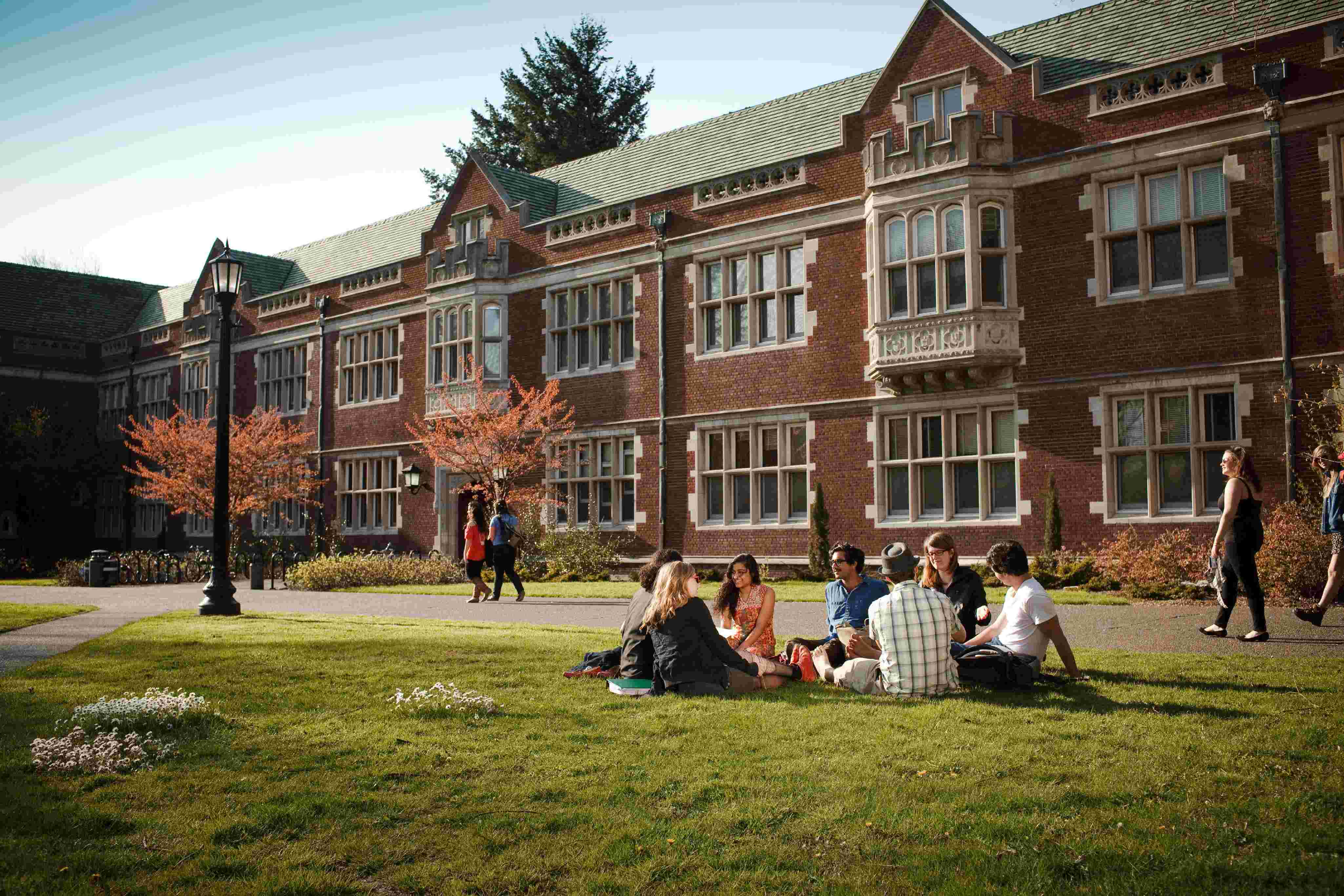
There’s been much discussion recently about President Kroger’s intervention into two Paideia classes that he felt were inappropriate. Many students and alumni were critical of the president’s decision, believing it to be out of line with Reed’s cultural values. Just as the Reed community has dealt with campus-wide issues in the past, President Kroger met with current students to hear their concerns, and to pledge greater dialogue moving forward. Over the past few weeks, students have had a chance to gather with President Kroger, voice their concerns and find some closure, while alumni have mostly had to watch from a distance.
Following the controversy, some students and alumni expressed opposition to supporting the college and the Annual Fund. As young alumni members of AFR (Alumni Fundraising for Reed), we want to address the issue head on.
Continue reading Beyond Paideia
March Gets RAW
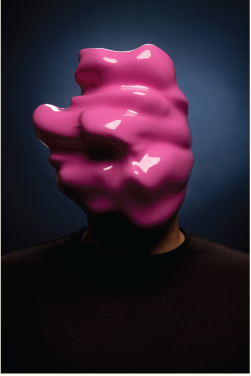
Zach Blas is one of the featured artists at RAW.
Reed Arts Week (known to the initiated as RAW), Reed's annual student-run arts festival is back, and this year it is bringing some of the best artists and performers from around the nation, and around campus. Check out the press release:
The 24th annual Reed Arts Week (RAW) is pleased to announce the theme REVERIE. We see it as an opportunity to consider the fluidity of the aesthetic and physical dispositions by which we situate ourselves. To experience REVERIE is to become dislocated, excised from the familiar and submerged in the irrational. RAW 2013: REVERIE aims to invoke an atmosphere of amorphous resolution, a space in which participants can confront the dubiousness of their situations and acknowledge the indeterminacy upon which they situate themselves. During March 6–10, the Reed College campus will host visiting artists, lectures, installations, performances, and student art projects.
Continue reading March Gets RAW
Reed Takes to the Road in Seattle
Lively debate marked the Seattle kickoff event of Reed on the Road 2013 on Wednesday, February 20. More than 60 alumni, parents, and friends gathered at the Women’s University Club to toast the success of the recently completed Centennial Campaign and discuss the future of the college.
Lisa Mennet ’83 introduced a video highlighting campaign’s achievements, including the more than $74 million raised for financial aid. The 12,732 donors are changing the life trajectory of current and future Reed students, she said. And while the audience might not recognize the faces of current students captured in the video, “you will recognize their spirits.”
At a time when other colleges are considering layoffs and shutting down programs, Reed has never been in better financial shape, Reed College president John Kroger said in his opening remarks.
Continue reading Reed Takes to the Road in Seattle
Paideia Pandemonium
Reed alumni have been even more passionate and engaged than usual in recent weeks over an issue that outsiders will find hard to fathom—Paideia.
Paideia is, of course, Reed’s “winter term.” During a week in January, students, alumni, and staff hold classes on any subject they deem worthwhile. From the geology of Portland to underwater basketweaving to how to play a didgeridoo, the classes range from the serious to the surreal. Dr Demento is a regular attraction. (I’ve held a “reporters bootcamp” for the last several years, in an effort to acquaint students with journalistic fundamentals. And in deference to those fundamentals, I should remind readers that I work at Reed and that my views are correspondingly colored-- see comments.)
Students gain no academic credit for these classes—indeed, most of them are one-time gatherings of like-minded souls who want to go birdwatching, deconstruct Zappa, or decorate Dixie cups.
Continue reading Paideia Pandemonium
Reed's Radiolab
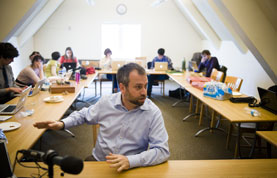
Robert Smith ’89 leads a group of students and alumni through the first Radio Bootcamp. Photos by Leah Nash
NPR reporter Robert Smith ’89 is sick of working with Oberlin graduates. Not that he has a problem with Oberlin—his wife attended—he really just wants to see more Reed students involved in radio journalism. For that reason, he flew to Portland to volunteer for Working Weekend ’13, during which he conducted the first Radio Bootcamp, a two-day crash course in the art of radio.
Continue reading Reed's Radiolab
Inventors Hailed at Working Weekend
Thanks to three Reedies who took top prize at the second annual StartUp Lab, biology students may soon find a new source of relief during their long hours in the lab.
Connor LaBean ’14, Anjuli Dharna ’14, and Ben Stephens ’14 were awarded $2,500 to help propel Genebot, a robotic lab assistant, from conception to reality.
Led by Bay-Area technology entrepreneur Lucas Carlson ’05, the StartUp Lab was an intensive simulation of the process of creating and selling an idea. Students worked with entrepreneurs and investors who helped them incubate ideas for start-up companies and strategize ways to bring the products to market. The Lab squeezed all the steps of an entrepreneur—inspiration, development, honing, and the pitch to an investor–into three short days, without ever leaving Vollum Hall.
The idea for Genebot came last summer after LaBean spent countless hours pipetting solutions in a Duke University lab for cloning experiments. A platform for DNA-sequence handling and cloning, Genebot would eliminate much of the manual labor from genetics research. It is capable of sharing data for open-source experiments and is projected to be marketable at a cheaper price than current alternatives. Currently, says LaBean, high-volume research is limited to biotech companies. Genebot would make such research affordable to institutions of lesser means and enable graduate students and interns to spend more of their time doing science.
Continue reading Inventors Hailed at Working Weekend
A Richard Crandall '69 Remembrance by Sam Danon
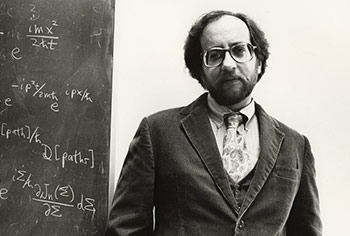
I heard that Richard is gone. I'm very saddened by the news. I already knew him, though not in the classroom, when he was an undergraduate, and then afterwards as a colleague. In those early years, when faculty and students from different and nominally unrelated disciplines were less insular, Gail Kelly, Richard and I sometimes had dinner together at Gail’s house, on Glenwood Street; I’d bring the oysters, Richard the wine, and Gail did the rest. It was great fun, and, with Gail present, the conversation was always animated. --- Once in a while I’d attend his “wild” parties; the liquor flowed, but the music was too loud for me, so I would not stay too long. --- Richard would often ask me to translate something for him from French, or give him the etymology of a word, or locate a quotation by a French author he had come across; the last such quote he asked me to identify was a short paragraph from Camus’ “The Myth of Sisyphus.” I never found out what he needed it for. --- When he had discovered another prime number, he was so excited that he stopped me on campus to tell me about it; he knew that the import of his discovery was lost on me, except of course for it’s being a discovery. --- Once, in the 1980s, after reading an article on deconstruction and quantum theory, I stopped by his office with my simpleminded questions. That’s when he named me something like “Distinguished Quantum Professor of Henry Street.” --- Over lunch one day, it became clear that we were both given to hypochondria; he subsequently would greet me in the street with, "Hi Sam, are we enjoying bad health?" --- I hadn’t heard from Richard for the past two to three years or so, but I knew he was around, building something complicated or writing a book or urging and guiding students and colleagues in the right direction. I'll miss him.
---Samuel Danon [French, 1962–2000]
Professor Emeritus
Continue reading A Richard Crandall '69 Remembrance by Sam Danon
Crandall Memorial Jan. 26
Please join us for a memorial to honor the late Richard Crandall ’69 [physics 1978–2012], on Saturday, January 26, at 2 p.m., in the Eliot Hall chapel.
Following the memorial, there will be a reception in the Gray lounge in Kaul Auditorium. The event is informal and open to the public.
Continue reading Crandall Memorial Jan. 26
Nuclear Croquet
Rivalry. Dominance. Betrayal. Recurring themes both in international politics and, of course, croquet.
In POL 240 (Introduction to International Politics), Prof. Alex Montgomery [poli sci] gives students a taste of territorial expansion, temporary alliances of convenience, and operation without a central authority by engaging them in a game of croquet. "Within minutes, a group of generally pacifistic, cooperative Reedies turn into vigorously competing, aggressive countries," he says. "Often they adopt names characteristic of their behavior—North Korea and Iran are very popular. The feedback from this exercise has been overwhelmingly positive; it makes concrete completely abstract theories about the balance of power, hegemonic dominance, and alliance formation."
Here students from POL 240 observe as Sophie Naranjo-Rivera '14 takes a whack at disrupting a shaky alliance between two rival teams. (Professor Montgomery is holding the clipboard.)
Continue reading Nuclear Croquet
Prof. Richard Crandall dead at 64
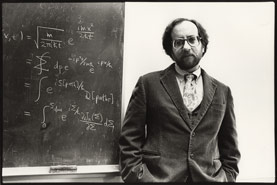
The polymath at work. Professor Richard Crandall ’69 [physics 1978–2012] knew how to cut through a tangle of equations to the root of the problem.
The Reed community was stunned today to learn that physicist, mathematician, computer scientist, and inventor Richard E. Crandall ’69 [physics 1978–] died this morning at Oregon Health and Science University Hospital.
The cause was not immediately clear, but Professor Crandall was recently diagnosed with acute myeloid leukemia.
It is impossible to catalogue Crandall’s myriad intellectual achievements on such short notice. He was a physics professor of great renown at Reed and beyond, skilled at constructing fundamental experiments on a shoestring budget (one of his favorite tricks involved demonstrating the Doppler shift in visible light using a couple of old stereo speakers).
Continue reading Prof. Richard Crandall dead at 64
Spring Fall Thesis Parade is a Soggy Success
Portland can be a bit gloomy this time of year, when unremitting rain provides the soundtrack for what can seem like unending final's work. But those grey skies couldn't dampen the spirit of the spring-fall thesis parade, which was celebrated last week in a particularly heartwarming bout of collective effervescence.
Bedecked in colorful costumes and covered in glitter, students danced and hugged each other to the beat of Reed’s drum corps. About 30 seniors hurled their thesis drafts on the bonfire in front of the library as classmates sprayed them with champagne (thankfully the temperature did not dip below the mid 50s).
Continue reading Spring Fall Thesis Parade is a Soggy Success
Top Oregon Court Overhauls Eyewitness ID Rules
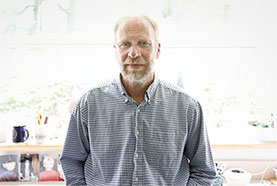
Memory expert and psychology professor Dan Reisberg found several problems with the methods investigators used to reconstruct the memory of the key witness in the case. Photo by Darryl James
The Oregon Supreme Court issued a landmark decision yesterday, proclaiming new legal standards for using eyewitness identification as evidence in criminal cases and granting a new trial to a man who was convicted of murder on the basis of an identification that the court deemed faulty.
The justices announced a unanimous ruling after reviewing thousands of pages of psychological research, including testimony from Professor Dan Reisberg [psychology 1986–], who identified several problems with the methods investigators used to identify the suspect.
Continue reading Top Oregon Court Overhauls Eyewitness ID Rules
< Prev 1 2 3 4 5 6 7 8 9 10 11 12 13 14 15 16 17 18 19 20 21 22 23 24 Next >

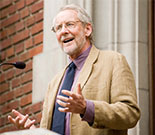
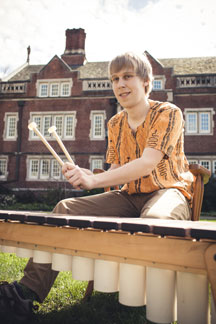
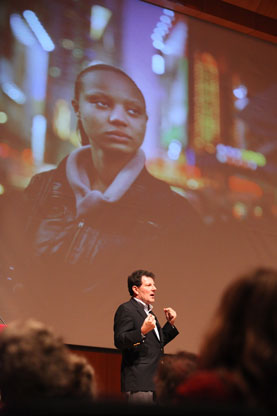
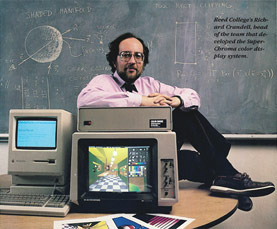
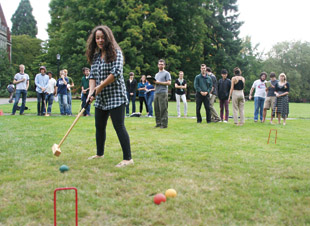
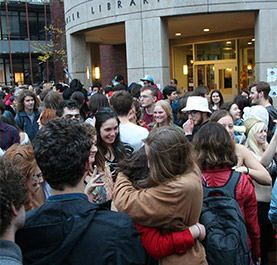

LATEST COMMENTS
steve-jobs-1976 I knew Steve Jobs when he was on the second floor of Quincy. (Fall...
Utnapishtim - 2 weeks ago
Prof. Mason Drukman [political science 1964–70] This is gold, pure gold. God bless, Prof. Drukman.
puredog - 1 month ago
virginia-davis-1965 Such a good friend & compatriot in the day of Satyricon...
czarchasm - 4 months ago
John Peara Baba 1990 John died of a broken heart from losing his mom and then his...
kodachrome - 7 months ago
Carol Sawyer 1962 Who wrote this obit? I'm writing something about Carol Sawyer...
MsLaurie Pepper - 8 months ago
William W. Wissman MAT 1969 ...and THREE sisters. Sabra, the oldest, Mary, the middle, and...
riclf - 10 months ago